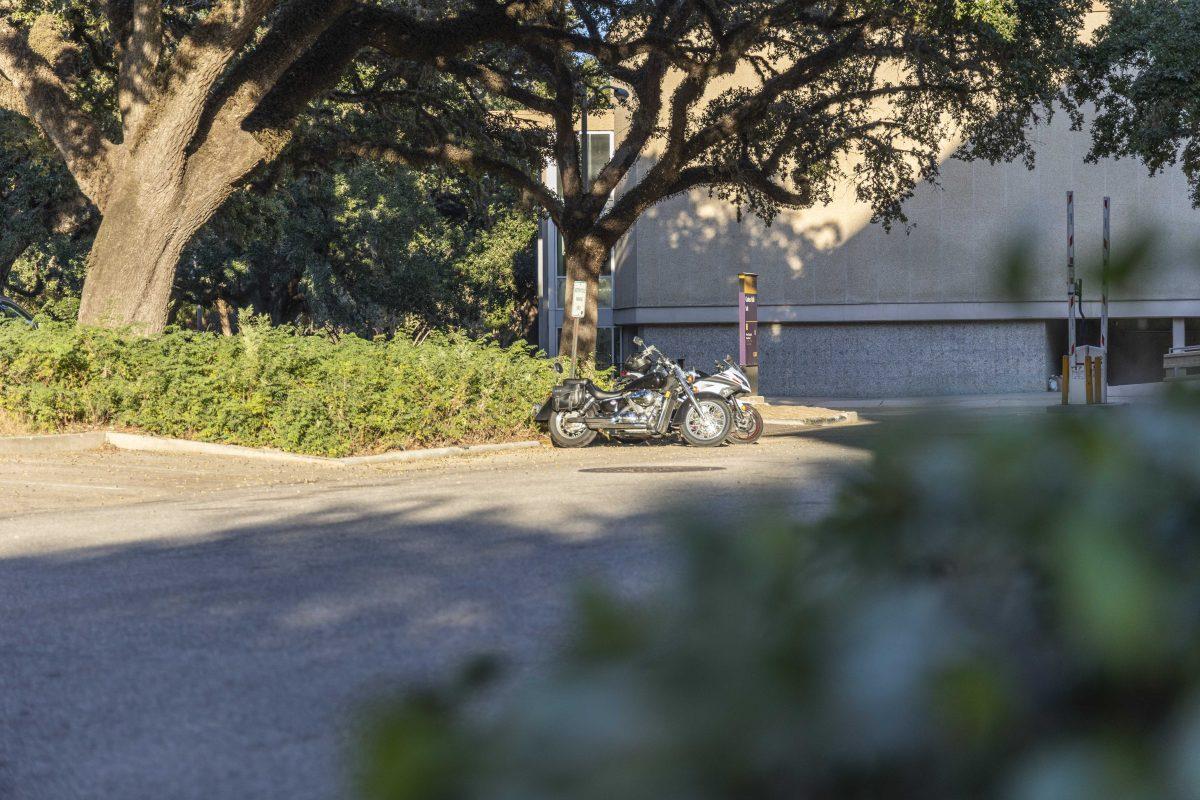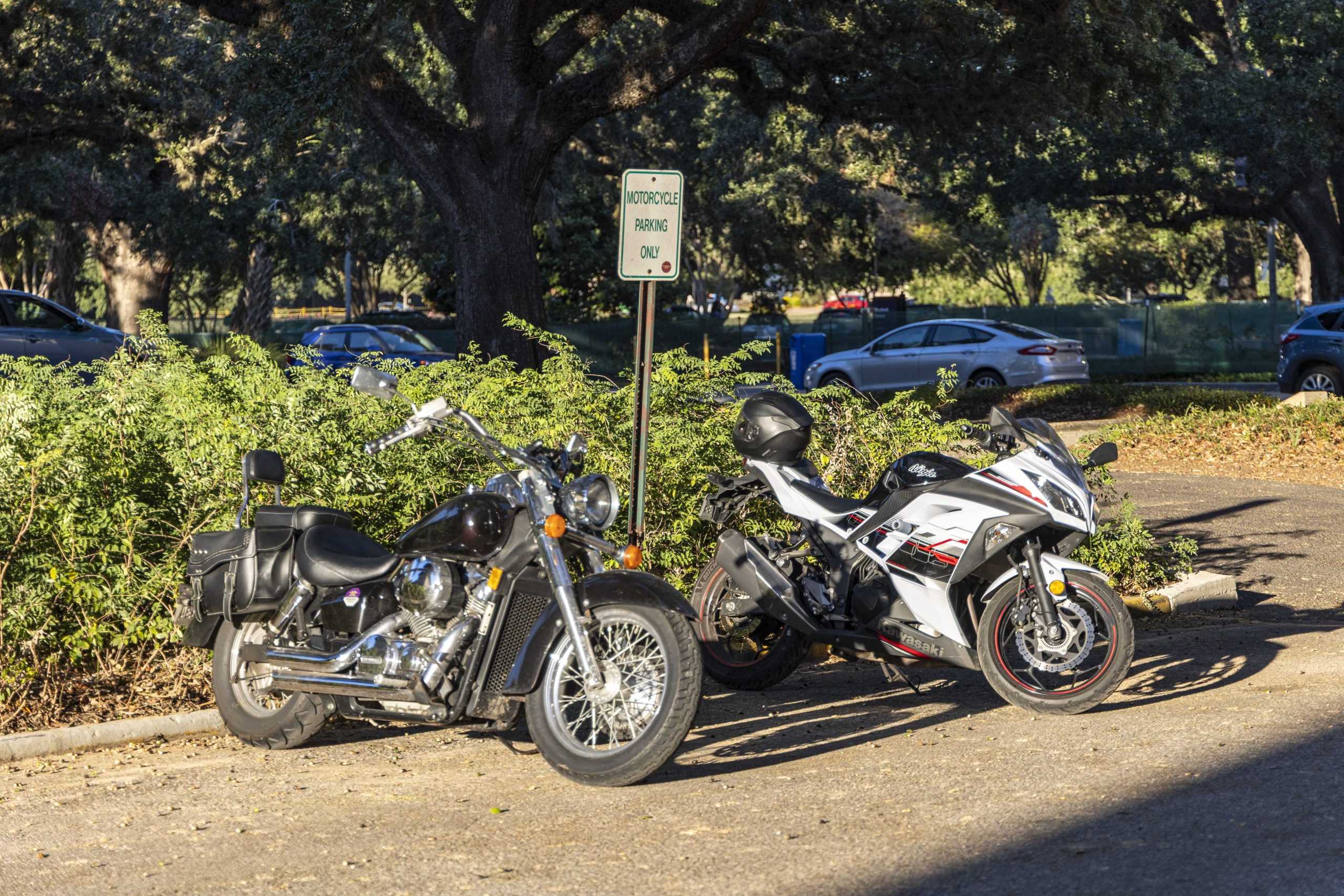Parking lots close to LSU’s central campus are often congested during peak hours, but no matter the time of day, motorcycle parking near the heart of LSU remains clear and free. Could switching to two wheels make getting to class easier for some?
Parking at LSU has long been a sore spot for those who drive to campus. Each semester brings renewed complaints from those who say they have difficulty finding spots close to where they live, work or have classes.
The Reveille reported in January that some disabled students struggle to find accessible parking on campus. In March, construction on the French House drew criticism as expansion of nearby greenspaces diminished parking.
READ MORE: The various ways LSU students travel to and around campus
One community member surmised campus frustration well in an August 2022 interview with the Reveille.
“I think they [Parking and Transportation Services] try, but I think it’s a mentality on campus that parking is always going to be an issue and that’s just how it is,” said Chantel Brown, then the assistant accounting manager of Sponsored Program Accounting.
LSU Parking and Transportation Services acknowledges the discontent of some students, faculty and staff.
On their frequently-asked questions page, a tab reads a question many have asked themselves as they search for a spot: “Are there enough spaces on campus?”
According to Parking and Transportation, there are enough spaces on campus for the number of students, faculty, staff and visitors who come to LSU each day, but “the problem is that we are so large, that we cannot get them as close as everyone wants them to be.”
Motorcycles on campus
Costing only $45, motorcycle and scooter permits are cheaper than their car counterparts. They also guarantee parking in central campus.
In contrast, commuter and residential drivers pay $182 for parking permits and can’t always park close to central campus or their classes. Those who want to secure a spot at Union Square Parking Garage, attached to the Barnes & Noble, pay $363.
Faculty must pay $275 to park in unreserved spots or along the streets. A guaranteed parking space in a specific parking lot costs $550, and reserving a particular parking space is $1,100. The Union Square Parking Garage runs $700 for faculty.
All of these permits get cheaper as the year goes on, since there’s less time to use the permits, but they remain much steeper than the rates for motorcycles and scooters.
According to the LSU Office of Parking and Transportation, LSU has more than 23,500 parking spots on campus, but the large number of drivers and comparatively few parking spots in central campus mean many must park in lots on the outer edges of the university.
Meanwhile, many motorcycle parking spots remain open. Walking around campus, one can see these spots are frequently vacant.
“There’s a lot of walking at LSU, with a motorcycle…you get to park in places that are a lot closer to your class,” said Jude Calli, an engineering junior who rides a motorcycle.
Motorcycles can also be more cost effective than driving a car or truck. They’re cheaper machines and have lower insurance rates and less expensive maintenance costs.
“I pay insurance on my car for $400, but insurance on my motorcycle is $60,” said Tre Hawkins, an interdisciplinary studies junior and Ninja 400 rider.
The smaller engines of motorcycles make them more fuel efficient.
“Gas is a big one because it might take seven dollars to fill up my motorcycle, and it lasts about two weeks,” freshman Andrew Desilva said.
Of course, motorcycles also come with drawbacks.
They’re dangerous. With no airbags, seatbelt, crumple zones or roll cage, motorcycles put the rider at a greater risk than driving a car. These variables may stop many from switching to two wheels.
Calli’s parents, for example, weren’t enthusiastic when he started riding.
“No, they were not happy at all about me getting a bike because just in general, how unsafe they are,” Calli said. “You can only be as safe as your skill level. You have to know your limits and you have to know that you’re taking a risk every time you ride. But as long as you are 10 times a driver as everybody else on the road, then you can avoid most accidents. Now, if you keep improving your skill set every time you ride, then you can minimize accidents.”
In Louisiana, residents must obtain a motorcycle endorsement before they can drive a motorcycle. The endorsement is achieved after taking a safety course that covers motorcycle operation as well as defensive driving habits.
The dangers associated with motorcycles were top of mind for LSU students who don’t ride.
“I’d rather drive a truck,” sophomore Zain Qureshi said. “That’s what I’m driving right now. It feels much safer, and if someone were to pull out in front of me with my truck, I’m not going to go flying through the windshield, but with the motorcycle, you hit them like that, I mean, you’re in outer space.”
Ashe Baruiz, a junior in linguistic anthropology, has driven motorcycles before but now opts not to due to a close call in the past.
“Witnessing others around me, specifically in the city, how they treat motorcycles really concerned me, so I stopped because it’s just a lot of danger,” Baruiz said. “Baton Rouge specifically because they [other drivers] will purposely do things to mess with motorcycles on the road. They’ll cut in front of them, a lot of just unsafe actions.”
Some refrain from riding to campus on a bicycle for the same reason. Baton Rouge has a history of concerns with biker and pedestrian deaths and injuries, though government officials and students have been working toward improvements.
READ MORE: On-campus parking changes are introduced this fall
Do you have any transportation-related topics or concerns you want the Reveille to cover? Email editor@lsu.edu or send us an anonymous tip through our form.






